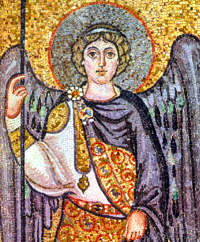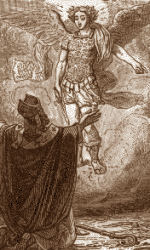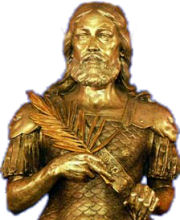12. I have yet many things to say to you, but you cannot bear them now.
13. However when he, the Spirit of truth, is come, he will guide you into all truth; for he shall not speak of himself, but whatsoever he shall hear, that shall he speak; and he will show you things to come.
14. He shall glorify me; for he shall receive of mine and shall show it to you.
15. All things that the Father has are mine; therefore said I, that he shall take of mine, and shall show it to you.
THEOPHYL. Our Lord having said above, It is expedient for you that I go away, He enlarges now upon it: I have yet many things to say to you, but you cannot bear them now.
AUG. All heretics, when their fables are rejected for their extravagance by the common sense of mankind, try to defend themselves by this text; as if these were the things which the disciples could not at this time bear, or as if the Holy Spirit could teach things, which even the unclean spirit is ashamed openly to teach and preach.
But bad doctrines such as even natural shame cannot bear are one thing, good doctrines such as our poor natural understanding cannot bear are another. The one are allied to the shameless body, the other lie far beyond the body. But what are these things which they could not bear; I cannot mention them for this very reason; for who of us dare call himself able to receive what they could not? Some one will say indeed that many, now that the Holy Ghost has been sent, can do what Peter could not then, as earn the crown of martyrdom.
But do we therefore know what those things were, which He was unwilling to communicate; for it seems most absurd to suppose that the disciples were not able to bear then the great doctrines, that we find in the Apostolic Epistles, which were written afterwards, which our Lord is not said to have spoken to them. For why could they not bear then what every one now reads and bears in their writings, even though he may not understand? Men of perverse sects indeed cannot bear what is found in Holy Scripture concerning the Catholic faith, as we cannot bear their sacrilegious vanities; for not to bear means not to acquiesce in.
But what believer or even catechumen before he has been baptized and received the Holy Ghost, does not acquiesce in and listen to, even if he does not understand, all that was written after our Lord's ascension; But some one will say, Do spiritual men never hold doctrines which they do not communicate to carnal men, but do to spiritual?
There is no necessity why any doctrines should be kept secret from the babes and revealed to the grown up believers. Spiritual men ought not altogether to withhold spiritual doctrines from the carnal, seeing the Catholic faith ought to be preached to all; nor at the same time should they lower them in order to accommodate them to the understanding of persons who cannot receive them, and so make their own preaching contemptible, rather than the truth intelligible.
So then we are not to understand these words of our Lord to refer to certain secret doctrines which if the teacher revealed, the disciple would not be able to bear, but to those very things in religious doctrine which are within the apprehension of all of us. If Christ chose to communicate these to us, in the same way in which He does to the Angels, what men, yea what spiritual men, which the Apostles were not now, could bear them? For indeed every thing which can be known of the creature is inferior to the Creator; and yet who is silent about Him?
While in the body we cannot know all the truth, as the Apostle says, We know in part (1 Cor 13); but the Holy Spirit sanctifying us fits us for enjoying that fullness of which the same Apostle says, Then face to face. Our Lord's promise, But when He the Spirit of truth shall come, He shall teach you all truth, or shall lead you into all truth, does not refer to this life only, but to the life to come, for which this complete fullness is reserved. The Holy Spirit both teaches believers now all the spiritual things which they are capable of receiving, and also kindles in their hearts a desire to know more.
DIDYMUS. Or He means that His hearers had not yet attained to all those things which for His name's sake they were able to bear; so, revealing lesser things, He puts off the greater for a future time, such things as they could not understand till the Cross itself of their crucified Head had been their instruction. As yet they were slaves to the types, and shadows, and images of the Law, and could not bear the truth of which the Law was the shadow. But when the Holy Ghost came, He would lead them by His teaching and discipline into all truth, transferring them from the dead letter to the quickening Spirit, in Whom alone all Scripture truth resides.
CHRYS. Having said then, you cannot bear them now, but then you shall be able, and, The Holy Spirit shall lead you into all truth; lest this should make them suppose that the Holy Spirit was the superior, He adds, For He shall not speak of Himself, but whatsoever He shall hear, that shall He speak.
AUG. This is like what He said of Himself above, i.e., I can of My own Self do nothing; as I hear I judge. But that may be understood of Hi m as man; how must we understand this of the Holy Ghost, Who never became a creature by assuming a creature? As meaning that He is not from Himself: The Son is born of the Father, and the Holy Ghost proceeds from the Father. In what the difference consists between proceeding and being born, it would require a long time to discuss, and would be rash to define.
But to hear is with Him to know, to know to be. As then He is not from Himself, but from Him from Whom He proceeds, from Whom His being is, from the same is His knowledge. From the same therefore His hearing. The Holy Ghost then always hears, because He always knows; and He has heard, hears, and will hear from Him from Whom He is.
DIDYMUS. He shall not speak of Himself, i.e., not without Me, and Mine and the Father's will: because He is not of Himself, but from the Father and Me. That He exists, and that He speaks, He has from the Father and Me. I speak the truth; i.e., I inspire as well as speak by Him, since He is the Spirit of Truth. To say and to speak in the Trinity must not be understood according to our usage, but according to the usage of incorporeal natures, and especially the Trinity, which implants Its will in the hearts of believers, all of those who are worthy to hear It.
For the Father then to speak, and the Son to hear, is a mode of expressing the identity of their nature, and their agreement. Again, the Holy Spirit, Who is the Spirit of truth, and the Spirit of wisdom, cannot hear from the Son what He does not know, seeing He is the very thing which is produced from the Son, i.e. truth proceeding from truth, Comforter from Comforter, God from God. Lastly, lest any one should separate Him from the will and society of the Father and the Son, it is written, Whatsoever He shall hear, that shall He speak.
AUG. But it does not follow from hence that the Holy Spirit is inferior; for it is only signified that He proceeds from the Father.
AUG. Nor let the use of the future tense perplex you; that hearing is eternal, because the knowledge is eternal. To that which is eternal, without beginning, and without end, a verb of any tense may be applied. For though an unchangeable nature does not admit of was and shall be, but only is, yet it is allowable to say of It, was and is and shall be: was, because It never began; shall be, because It never shall end; is, because It always is.
DIDYMUS. By the Spirit of truth too the knowledge of future events has been granted to holy men. Prophets filled with this Spirit foretold and saw things to come, as if they were present: And He will show you things to come.
BEDE. It is certain that many filled with the grace of the Holy Spirit have foreknown future events. But as many gifted saints have never had this power, the words, He will show you things to come, may be taken to mean, bring back to your minds the Joys of your heavenly country. He did however inform the Apostles of what was to come, viz. of the evils that they would have to suffer for Christ's sake, and the good things they would receive in recompense.
CHRYS. In this way then He raised their spirits; for there is nothing for which mankind so long, as the knowledge of the future. He relieves them from all anxiety on this account, by showing that dangers would not fall upon them unawares. Then to show that He could have told them all the truth into which the Holy Spirit would lead them, He adds, He shall glorify Me.
AUG. By pouring love into the hearts of believers, and making them spiritual, and so able to see that the Son Whom they had known before only according to the flesh, and thought a man like themselves, was equal to the Father. Or certainly because that love filling them with boldness, and casting out fear, they proclaimed Christ to men, and so spread His fame throughout the whole world. For what they were going to do in the power of the Holy Ghost, this the Holy Ghost says He does Himself.
CHRYS. And because He had said, You have one Master, even Christ (Matt 23:8), that they might not be prevented by this from admitting the Holy Ghost as well, He adds, For He shall receive of Mine, and shall show it to you.
DIDYMUS. To receive must be taken here in a sense agreeable to the Divine Nature. As the Son in giving is not deprived of what He gives, nor imparts to others with any loss of His own, so too the Holy Ghost does not receive what before He had not; for if He received what before He had not, the gift being transferred to another, the giver would be thereby a loser.
We must understand then that the Holy Ghost receives from the Son that which belonged to His nature, and that there are not two substances implied, one giving and the other receiving, but one substance only. In like manner the Son too is said to receive from the Father that wherein He Himself subsists. For neither is the Son any thing but what is given Him by the Father, nor the Holy Ghost any substance but that which is given Him by the Son.
AUG. But it is not true, as some heretics have thought, that because the Son receives from the Father, the Holy Ghost from the Son, as if by gradation, that therefore the Holy Ghost is inferior to the Son. He Himself solves this difficulty, and explains His own words: All things that the Father has are Mine; therefore said I, that He shall take of Mine, and shall show it to you.
DIDYMUS. As if He said, Although the Spirit of truth proceeds from the Father, yet all things that the Father has are Mine, and even the Spirit of the Father is Mine, and receives of Mine. But beware, when you hear this, that you think not it is a thing or possession which the Father and the Son have. That which the Father has according to His substance, i.e. His eternity, immutability, goodness, it is this which the Son has also.
Away with the evils of logicians who say, therefore the Father is the Son. Had He said indeed, All that God has are Mine, impiety might have taken occasion to raise its head; but when He said, All things that the Father has are Mine, by using the name of the Father, He declares Himself the Son, and being the Son, He usurps not the Paternity, though by the grace of adoption He is the Father of many saints.
HILARY. Our Lord therefore has not left it uncertain whether the Paraclete be from the Father, or from the Son; for He is sent by the Son, and proceeds from the Father; both these He receives from the Son. You ask whether to receive from the Son and to proceed from the Father be the same thing.
Certainly, to receive from the Son must be thought one and the same thing with receiving from the Father; for when He says, All things that the Father has are Mine, therefore said I, that He shall receive of Mine, He shows herein that the things are received from Him, because all things which the Father has are His, but that they are received from the Father also. This unity has no diversity; nor does it matter from whom the thing is received; since that which is given by the Father is counted also as given by the Son.
Catena Aurea John 16


 Various apparitions of this powerful Angel have proved the protection of Saint Michael over the Church. We may mention his apparition in Rome, where Saint Gregory the Great saw him in the air sheathing his sword, to signal the cessation of a pestilence and the appeasement of God’s wrath. Another apparition to Saint Ausbert, bishop of Avranches in France, led to the construction of Mont-Saint-Michel in the sea, a famous pilgrimage site. May 8th, however, is destined to recall another no less marvelous apparition, occurring near Monte Gargano in the Kingdom of Naples.
Various apparitions of this powerful Angel have proved the protection of Saint Michael over the Church. We may mention his apparition in Rome, where Saint Gregory the Great saw him in the air sheathing his sword, to signal the cessation of a pestilence and the appeasement of God’s wrath. Another apparition to Saint Ausbert, bishop of Avranches in France, led to the construction of Mont-Saint-Michel in the sea, a famous pilgrimage site. May 8th, however, is destined to recall another no less marvelous apparition, occurring near Monte Gargano in the Kingdom of Naples.  At Constantinople, St. Acathius, who, being denounced as a Christian by the tribune Firmus, and cruelly tortured at Perinthus by the judge Bibian, was finally condemned to death at Byzantium by the procunsul Flaccinus. His body was afterwards miraculously brought to the shore of Squillace in Calabria, where it is preserved with honor. — Excerpted from the Martyrology.
At Constantinople, St. Acathius, who, being denounced as a Christian by the tribune Firmus, and cruelly tortured at Perinthus by the judge Bibian, was finally condemned to death at Byzantium by the procunsul Flaccinus. His body was afterwards miraculously brought to the shore of Squillace in Calabria, where it is preserved with honor. — Excerpted from the Martyrology.


